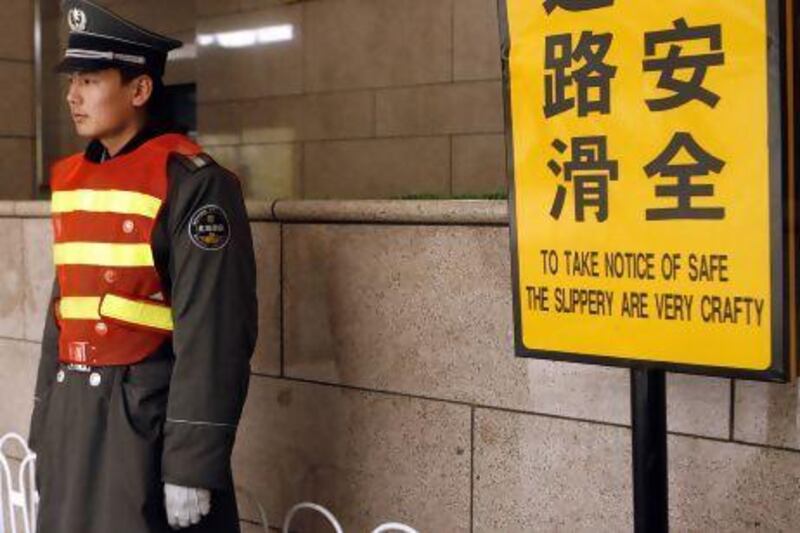BEIJING // Until recently, foreign customers could be forgiven for not wanting to eat at Dou Man Jiang, a popular Chinese-Korean restaurant in Beijing's central Dong Cheng district.
Its English menu was confusing at best and downright unappetising at worst.
'Mixes the Platicodon Grandiflorum', 'DPRK's Greatly Miscellaneous, 'Warm surface' and a pale coloured broth, simply labelled 'Grim', were just some of the delicacies promised on the menu.
"We noticed people taking photos and laughing when they read the menu," said a waitress. Last year, the restaurant reprinted its menus in the hope that foreign customers would focus more on its delicious food than their poor translation.
"We have several youth hostels nearby, we need our menu to be clear for foreigners to understand," she said.
Its example has now been taken up by dozens of restaurants and shops, not least because the local government has this year unleashed a new assault on the use of bad English, or Chinglish.
China has been waging war on poor English in public places since Beijing was awarded the right to hold the 2008 summer Olympics in 2001.
Dong Cheng, because of the large number of foreigners who come here to see Tiananmen Square and the Forbidden City, is considered the front line.
"We want Beijing to be a 'world city" and Dong Cheng to be a window onto that city," said Qu Yanzhong, the deputy director of Dong Cheng Foreign Affairs Office.
"While these signs might be amusing to some they are embarrassing for us."
So now, as part of his new drive, teams of linguists are being dispatched on Chinglish search-and-destroy missions, backed up by urban enforcement officers.
They go out in groups of three or four and if they spot a badly worded sign the officers go in to speak to the shop owner.
In most cases the shop replaces the sign at their own cost, said Mr Qu, even though there is no law that deems such signs are illegal.
"They are happy to have the mistake pointed out. During our last trip there was only one guy, who refused to change his sign and to be honest the mistake wasn't that big," he said.
China has come a long way in its battle with Chinglish. When the bureau first started its work 2001 there were some shockers: an open air museum to China's 56 ethnic minorities in northern Beijing was titled "Racist Park" in English and it was common for wheelchair-access bathrooms to be labelled "Deformed Man Toilets."
Today, in central Beijing at least, the mistakes are of a different order, 'Roasted Duck' instead of 'Roast Duck' or shop signs saying 'Smoke Famous Name Wine' when really what is meant is "Brand name Tobacco and Spirits."
Such mistakes stem from the fact it is really quite difficult to translate from Chinese to English. There is also no good online computer program, which is what sign makers usually use.
Despite 16 years of compulsory English in Chinese schools, the general English skill level in the population remains low.
"English teaching in China is not that good," said Dai Congrong a professor of English at Shanghai's Fudan University and the first person to translate Finnegan's Wake into Chinese.
"Considering the amount of time spent on learning it, they should be fluent."
But poor teaching has not stopped people embracing the language, even if they do not always know exactly what they are saying.
Part of the reason for that is the appearance of English coincided with China's decision to open its doors to the world and shift to a market economy - something that has greatly benefited its people.
English progress was slow, starting in hotels and restaurants aimed at foreigners, but eventually it hit the mainstream, with many food companies and clothing brands including a few words on their products.
This hit a peak in the early 2000s when seemingly everything from pencil cases, Thermos flasks and swimsuits had random English phrases emblazoned on them.
Professor Dai said the trend has cooled as China's global status has risen, with Chinese also taking greater pride in their own heritage.
Despite its best efforts, Dou Man Jing is helping keep the phenomenon alive by creating new Chinglish-ims in its attempts to eradicate the old ones.
'DPRK's Greatly Miscellaneous', a salad, is now 'North Korea's Big Lift' and noodle soup formerly known as 'Warm Surface' has been rechristened 'Isotherm'.
foreign.desk@thenational.ae
SOME EXAMPLES OF CHINGLISH
Deformed Man Toilets, meaning Wheelchair-access bathrooms
Racist Park, meaning Ethnic Museum
Smoke Famous Name Wine, meaning Brand name Tobacco and Spirits
Grim, meaning broth





